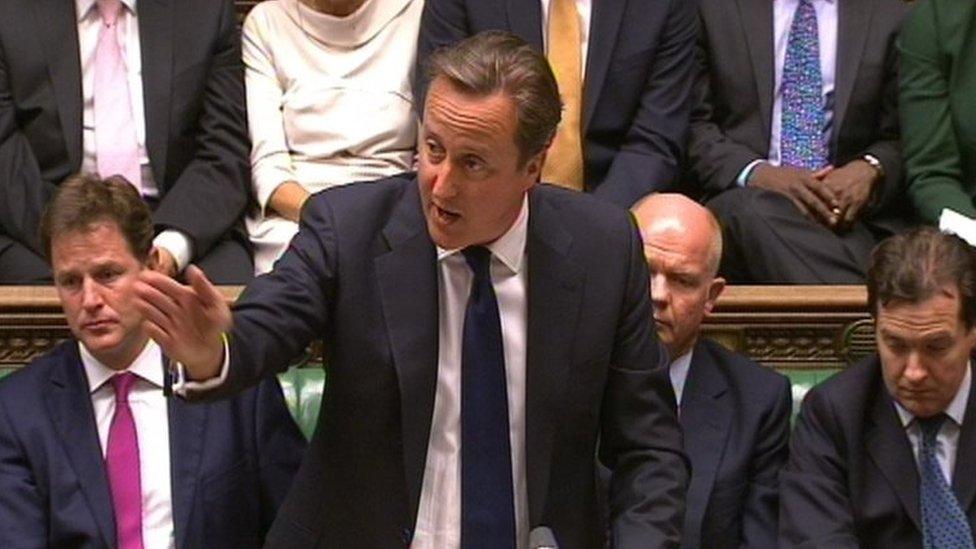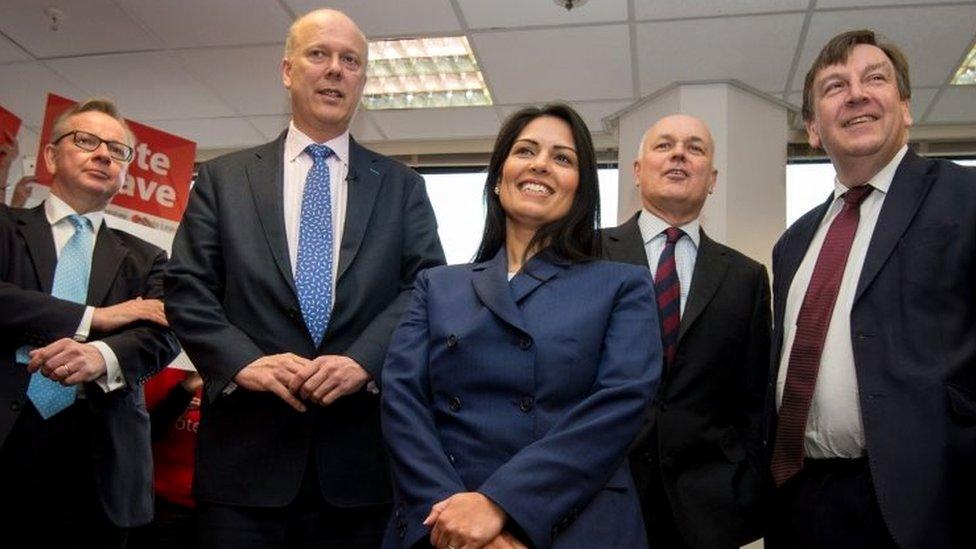How does David Cameron avoid Commons defeats?
- Published

The scene was set for a turbulent Parliament...
Where are the rebellions? Where are the government defeats in the Commons?
When David Cameron formed the first Conservative government since the demise of John Major's in 1997, most observers (me included) thought his narrow Commons majority would spell trouble, not least because a significant number of Tory backbenchers had acquired quite a taste for rebellion during the coalition years.
But so far, barring one admittedly stinging lost amendment on EU referendum purdah rules, there has been no repetition of the prime minister's abject and almost unprecedented humiliation in the 2013 vote on military intervention in Syria.
Even the increasingly snippy Euro-feuding in Tory ranks has not endangered that majority.
There are all kinds of reasons why.
First that majority is over a fragmented opposition; for the government to lose a Commons vote, it must be on an issue that unites Labour and the SNP, at least some of the smaller parties, and a number of Tory dissidents (a task made all the harder by the possibility that Labour MPs could split over a variety of contentious issues - Trident replacement, anyone?).

David Cameron suffered a Commons defeat over Syria in 2013
The Sunday trading vote is a case in point; as I write 22 Conservatives (and rising) have signed a Commons amendment to the Enterprise Bill to strike down the government's proposals to loosen the current restrictions.
But they are more than outweighed by the likely support of the SNP.
Cautious government
The Opposition can't beat the government in the Commons unless almost all its component parties are lined up to vote against it.
Just one opposition-uniting issue (EU purdah) has appeared so far, although next week's vote on Sunday trading and, further down the road, the newly published Investigatory Powers Bill might just provide more.
It's an interesting question how far the dearth of such issues is down to conscious choice.

Conservative MPs remember the John Major years
The 19th Century maxim that Whigs were about legislation and Tories were about administration may be coming back into force; the Cameron government's most contentious actions often seem to be administrative - not needing a Commons vote at all, or perhaps requiring secondary legislation rather than a full-dress bill. It's the hallmark of a very cautious government.
What all this implies is that there are occasions where the smaller parties can exercise considerable leverage.
They can choose their moment carefully, wait until the government is committed to a position and then search their souls and discover a reason not to support it.
Then they can allow themselves to be wooed back into the fold by suitable sweeteners.
'Best Chief Whip'
Perhaps this is one of the factors behind the government's impending climb-down on cuts to Short Money, likely to be embodied in a resolution of the House next week.
Short Money - named after the former Labour Deputy Leader Ted Short - is the money paid to opposition parties to support their Parliamentary work; the cuts were much resented by the smaller parties and certainly made the government business managers' lives harder.
And at the heart of the government's undefeated Commons record, is the Tory whips office.

Mark Harper is in charge of party discipline
Chief Whip Mark Harper ("the best Chief for a generation," one source told me) gets good reviews from some surprising people, for smart judgement of the mood of his Commons flock.
The whips have all kinds of ways of making the lives of errant MPs difficult, and the "usual suspect" rebels may think his punishments of their infractions are heavy-handed - they would, wouldn't they?
But loyalists, especially those who, if you will excuse the mixed metaphor, have to grit their teeth when they toe the line, rather relish the resounding public smack of firm government. A number thoroughly enjoyed the removal of awkward squaddie Chris Chope from a plum role on the Council of Europe.
Reconciliation and revenge
In the last Parliament the EU was a deadly issue for the Conservative leadership; it was John Barron's precision-targeted amendment to the Queen's Speech regretting the lack of an EU referendum that forced the Conservative leadership into attempting to get a referendum bill through as a Private Members Bill (the Lib Dems vetoed having a full government Bill) and then into the manifesto commitment which led inexorably to the vote due in June.
The leadership may not have liked it, but it produced a position around which the Conservative Party could unify - for the time being.
So in this Parliament, with a referendum legislated for and a date set, there have been few occasions for euro-rebellion.
But what happens after the referendum is anyone's guess.

Cabinet Euro-rebels are at odds with prime minister
Acrimony is on the rise in the referendum debate, words are being spoken that will not be easily forgotten, and the prime minister and Mr Harper will doubtless be pondering the exact combination of reconciliation and revenge they should deploy to keep the party together.
They will be helped by the increasing realisation that, given Labour's disarray, the Tories could be in power for quite a while, as long as they avoid civil war.
Guerrilla campaign
That message is being whispered into certain ears by a group of Parliamentary patriarchs who retain post-traumatic memories of the Maastricht era and its disastrous impact on the Major government.
As we know, referendums are supposed to settle big questions the parties in parliament cannot resolve for themselves, and settle them for a generation.
And as we also know, it doesn't always work out that way; ask the SNP.
Disappointment is one of the most corrosive emotions in politics, and a close vote to stay in will mean the Euro-pot continues to simmer and may occasionally boil over.
It could provoke a Commons guerrilla campaign by some Conservative Brexiteers, against contentious EU-related measures, but, again, for them to win they would need the support of the mostly pro-EU opposition parties, which looks improbable on most issues.
On the other hand, a vote to leave will overturn the Tory top table, and result in a new leadership, leaving the pro-EU wing with nowhere to go.
It is hard to imagine pro-EU Tories daring to defy a referendum vote to leave, by rebelling on the necessary legislation.
There are many cleaner ways to commit political suicide than that. But a close Remain vote is more dangerous to party unity.